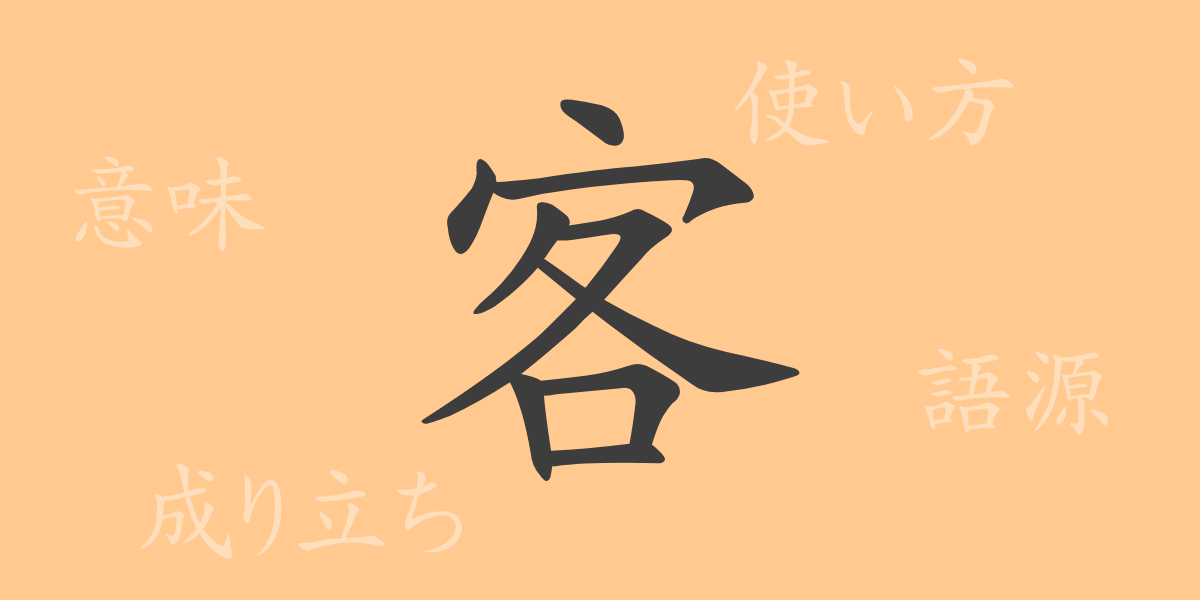The Japanese language contains many kanji characters that hold meanings beyond just their written form. The character “客” (kyaku) also carries deep history and rich meaning. This article explores the origins, uses, and common idioms and proverbs associated with “客” (kyaku), uncovering its charm. From business scenes to everyday conversations, let’s delve into the world of “客” (kyaku) and understand its close ties to our daily lives.
Origin of 客 (語源)
The kanji “客” (kyaku) has ancient origins, with its earliest form seen in Chinese oracle bone inscriptions. Originally, it meant “a person staying overnight” or “traveler.” Over time, it came to mean “visitor” or “guest.” The ancient Chinese culture of hospitality towards guests is embedded in this kanji, suggesting warmth and welcome.
Meaning and Usage of 客 (kyaku)
In modern Japanese, “客” (kyaku) is widely used to refer to people visiting stores or facilities, such as “顧客” (こきゃく, kokyaku, customer) or “来客” (らいきゃく, raikyaku, visitor). In business settings, it is often used with an honorific, “お客様” (おきゃくさま, okyakusama), to show respect, especially in the service industry. It can also be used metaphorically to mean “stranger,” as in “客のような顔をする” (きゃくのようなかおをする, kyaku no you na kao o suru), meaning “to act like a stranger.”
Reading, Stroke Count, and Radical of 客 (kyaku)
Let’s look at the readings and basic information of the kanji “客” (kyaku).
- Reading: The on-yomi (Chinese reading) is “キャク” (kyaku); there is no kun-yomi (Japanese reading).
- Stroke count: 9 strokes.
- Radical: The radical is “宀” (うかんむり, ukanmuri), meaning roof.
Idioms, Proverbs, and Expressions Using 客 (kyaku)
There are many idioms, proverbs, and expressions that include “客” (kyaku) in Japanese. Here are a few examples with their meanings:
- 「招客」 (しょうきゃく, shoukyaku): To invite guests or the guests who are invited.
- 「無客」 (むきゃく, mukyaku): Having no guests; the state of not having visitors.
- 「客人」 (きゃくじん, kyakujin): A person who comes as a guest; a visitor.
- 「客観的」 (きゃっかんてき, kyakkanteki): Objectively; viewing things without personal bias.
- 「客土」 (きゃくど, kyakudo): Soil brought from another place.
These expressions are frequently used in business and daily conversations, showcasing the versatile concept of “客” (kyaku) in various contexts.
Summary on 客 (kyaku)
The meanings embedded in a single kanji character reflect the depth of its culture and history. The kanji “客” (kyaku) is no exception, with a broad range of usage from business to daily life. The word “お客様” (okyakusama) embodies the spirit of hospitality and respect that is fundamental in Japanese service industries. We hope this article has helped you understand the rich meanings and uses of the kanji “客” (kyaku), and appreciate its depth even more.

























